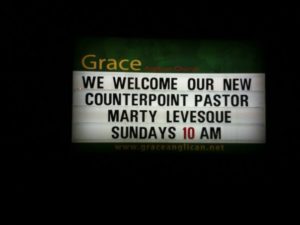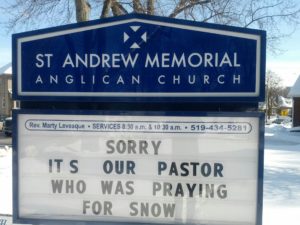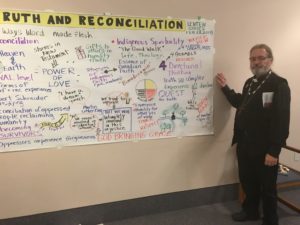This past Sunday I attended St Andrew Memorial’s 75th-anniversary celebration. It was great to be back at St Andrew Memorial and back in London. It has been just about 10 years since I first came to London On from the Nations Capital. 10 years is a long time. And now that I have moved and have begun to settle in Waterloo On at my new parish of All Saints, I thought it was a good time for a retrospective of the last decade.
As a mechanic and a budding academic and theologian I left Ottawa in 2007, with a BA in Philosophy under my belt and looking forward to studying Theology at Huron University College. Little did I know that during the decade to come I would earn not one but two masters: A Masters of Divinity with Distinction and a Masters of Arts, Theology.
I would serve two different communities as lead pastor. The first was Counterpoint, a Fresh Expression church plant in Brantford On. The second was St Andrew Memorial in London On.

The beginning of Counterpoint
Counterpoint was a most interesting experience. I began my ministry there with the three families as my plant team. Our service reflected that we were something new and something fresh, but also we leaned on the historical roots of the Anglican Church. Our first Sunday together was September 13, 2009, a welcome BBQ with our sponsoring congregation of Grace Church Brantford. September 20 marked the first Sunday of my ministry with my 3 families and planting a new church in the Diocese of Huron.
Over the course of the next eight months, we worked hard to advertise, market, and evangelize our friends and neighbours. We reached out to the community, learned their needs and sought to meet those needs as the hands and feet of Jesus Christ. Our attendance gradually increased, moving from 19 on my first Sunday to averaging over 50’s in March of 2010.
Unfortunately, my time with Counterpoint would be cut short due to complications with the sponsoring parish and the rector of Grace Church. Even though Counterpoint was thriving, Grace was not. The decision to alter the planting of this new church in the Diocese of Huron was made without consultation of the new plant community and myself. As the relationship between the rector and myself continued to sour the bishop decided that he needed to act and I was removed from Counterpoint in May of 2010.
Unfortunately, the energy and missional focus was lost and the community never fully recovered. After a few more years of struggling along, the plant was brought to a conclusion and the opportunity to plant a new church in the Diocese of Huron was lost.

St Andrew Memorial
My next stop was St Andrew Memorial in London. I began my ministry there in November 2010 tasked with the revitalization of an underperforming parish. Since the turn of the century, St Andrew Memorial had depleted their capital reserves, their stewardship had dropped over 35% and attendance had steadily declined.
When I arrived the average Sunday attendance was 50 and they were running a structural deficit of approximately $15 000 per year. We got to work immediately rebranding the parish, updating their vision, mission and values and creating an online and social media presence. Over the next 5 years, we would work to update and modernize the facilities through a major capital campaign.

The new sign
During this time a new exterior illuminated signage was installed, the kitchen was renovated and brought up to code, the Sunday School room was renovated and modernized to create a welcoming and warm learning environment, a new audio and visual system was installed in the sanctuary and the old church was converted to accommodate the London Consistory Club and The Learning Center.
The empty lot next to the rectory was converted into a community garden in 2011. This was made possible through partnerships with London Community Resource Center, a SPARKS community development grant from the City of London, a micro-grant from LondonSOUP and support from the London Community Foundation and the Faith In Action trust of the Diocese of Huron.

Community Garden, Pollination Garden and Fruit trees
St. Andrew Memorial also has begun to add fruit trees to ring the garden, making this garden project a focal point for area residents and helping to make Old South one of the best neighborhoods in London, Ontario in which to live and work. 2014 saw the addition of the pollination garden thanks in part to the Julia Hunter Foundation. Over the years, the continued work of St. Andrew Memorial through the Community Garden has resulted in thousands of pounds of fresh produce being sent to the Fellowship Centre at St. Paul’s Cathedral to feed our brothers and sisters in London.
In addition, political activity and petitions have helped the Government of the Province of Ontario enact legislation to ban neonicotinoids, the pesticide responsible for the destruction to the pollinator population.
As a result of the great work done through the Community Garden St. Andrew Memorial has been featured in news stories in the Huron Church News, Anglican Journal, and the London Community News, which has helped create a point of entry into the parish and a point of evangelism.
With the closing of our neighboring parish, Christ Church, St. Andrew Memorial brought the Community Breakfast program to its campus in the spring of 2014. This monthly breakfast program offers hospitality meals to area residents.
As my time came to a close in April 2016 at St Andrew Memorial the structural deficit had been eliminated and the endowments of the parish were being rebuilt, having been doubled in the past 6 years. Sunday attendance had risen from 50 to 75 and the parish was once again a strong healthy congregation in Old South.
The mission outreach of St Andrew Memorial continued to grow each year between the garden, the breakfast and a myriad of other mission outreach activities including the sponsoring of a Syrian refugee family. The parish reached a tithe, which is to say, they gave away in direct mission activities 10% of their income to the building of the kingdom of God.

City Council Gallery before vote on Fanshawe/Kingsmill redevelopment
My time in London was not limited to just the parish though. I had the opportunity to become involved deeply in the life of the community and the city. When city council looked to cut the affordable housing budget, I organized the Anglican churches in London, along with our ecumenical partners to bring a petition forward to city council expressing on behalf of the various communities and congregations that we opposed the cut to the affordable housing budget. City council reversed its decision and the budget was maintained.

Work has begun on the old Kingmill’s department store
These political activities lead to me being asked to serve on the board of directors for Emerging Leaders London. Emerging Leaders is a non-profit whose mandate is to retain, attract and connect young talent in London On. Of the many activities of Emerging Leaders, London X, Work in London Symposium and monthly mixers, the work I am most proud of was the organizing and advocating to London City Council, working in partnership with Fanshawe College, for the creation of the new downtown campus location in the old Kingsmill department store. This work will profound alter and help to revitalize the downtown core.
I also had the privilege to serve the board of directors of Mission Services London. During my 2 year tenure on the board of directors, we oversaw the development of the new Mission Services Thrift store, an expansion of 10 000 square feet of retail space and the relocation of the Mission Services head office to this new location. The increased size of the store will add a much-needed revenue into Mission Services through this social enterprise.
As a priest, I spend much of my days meeting with people, connecting people and working behind the scenes to help build strong Christian communities and connect those communities with the broader society where we all join together to be the hands and feet of Jesus Christ in the world today. I hope that the work I do each day will have an impact on my congregation, the community and the city in which I live and work.
As I look back over 10 years of service in London I can say that I am proud of what I have accomplished working with so many great people and great communities. I look forward to seeing the seeds that were planted continue to grow. And I pray that the mark I left on London will have a positive effect on the city and its citizens and people of faith.
This past Sunday was difficult in some ways, to come back to St Andrew Memorial and London, but it was also good. It marked for me an end. And as I drove to work today, to sit at my desk and plan the ways All Saints Waterloo will move into the future, grow and make an impact in its community and city I find myself looking forward with confidence and anticipation at what God has in store for me, this community and the next 10 years.
I would be remised if I didn’t take a moment to thank many of the people that I had the privilege to work with, learn from and be mentored by.
Rev Dr. William J Danaher Jr., friend and mentor who encouraged me to continue my education and pursue an MA.
Dr. Dan Smith, that one professor who helps you always be a better student and nurtures a passion in you for education and theology (and even the Greek language).
Dr. John Thorp, my MA thesis advisor who helped focus my thoughts.
Rev Rae Fletcher, mentor, priest and friend. You taught me to listen to my better angels and to see the positive in the people God sends my way.
Kent and Susanne Thomas, Peggy Rayner, Jim Stewart, long time wardens of St Andrew Memorial. All of you saw something in me and were willing to follow and to take calculated risks.
Nancy Barwick, the community garden coordinator. Your work to build, organize and plan has helped make the garden possible.
Lori Inrig, the community breakfast convenor. Your passion and kindness to provide that little extra at the breakfast is an inspiration of the type of kindness we all ought to reflect as children of God.
All the people of St Andrew Memorial for walking with me, forming me and helping me become a better pastor, a better friend, and a better husband and father.
Sean Quigley, executive director of Emerging Leaders London: friend, interlocutor, and drinker of beers.
Glen Pearson, mentor, friend and inspiration.
Peter Rozeluk, executive director of Mission Service who encouraged me to be a public theologian.
Rev Kevin Dixon, friend and mentor. Who has never been afraid to simply say, “oh, Marty…just shut up!”
Rev Canon June Hough, friend and mentor, who always made me laugh and waste just a few hours at the Waltzing Weasel.
And of course, Carolyn Marshall, spouse, lover, and best friend. I could have done none of the above without her steadfast support.



















